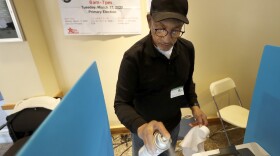Election eve was confusing. An announcement earlier in the day stated Ohio's March 17 primary was still on. But that afternoon, Gov. Mike DeWine said he was going to get a court to postpone it until June 2.
The court refused to do that. So later that evening, DeWine had Ohio Department of Health Director Dr. Amy Acton issue an order to close the polls on Election Day.
Ohio Democratic Party Chair David Pepper said he agreed the polls needed to be closed to protect the health of Ohioans because of rampant spread of coronavirus. But he says the party wanted to make sure Ohioans who didn’t get to vote March 17 got the chance later. So the party filed a lawsuit.
“Our No. 1 goal with our filing was to give the authority needed to actually extend the election forward,” Pepper said.
Pepper says his lawsuit wants to change the way DeWine and Secretary of State Frank LaRose suggested extending the vote. They wanted to allow mail-in voting with in-person voting June 2, with the assumption business would be back to normal then.
“We think it’s very unlikely that people will be able to actually vote in person on June 2," Pepper said. "So, if we set an entire calendar based on that very iffy proposition, that only threatens to add more chaos to an already unprecedented situation.”
Pepper wants to scrap in-person voting and extend mail-in voting until April 28. He says a June date puts candidates, who have already invested their time and money with the March date in mind, at a disadvantage.
The mail-in voting Pepper wants would allow for ballot drop-offs at boards of elections. Pepper says that would be fair and safe for all Ohioans.
Scott DiMauro with the Ohio Education Association also hates the idea of a June 2 deadline. He says the 99 school districts that had levies on the ballot need to know the outcome of the election well before June.
“There’s a provision in law that requires any nonrenewal notices for employees who are going to be laid off by June 1st," DiMauro said. "We really need to see the voting completed and the official election results tabulated well in advance of that so that school boards can make decisions and school employees can come up with a plan for next year.”
For his part, DeWine has indicated he’s flexible on that June 2 date.
“Well, we are open to discuss that. There’s nothing magic about June 2," he said. "The date was picked because it would give ample opportunity for people to have absentee ballots."
DeWine also said the deadline allowed Democrats and Republicans to pick their delegates.
But Pepper says June is too late.
“It puts the party in a position where we won’t even be seating delegates at the convention because the timeline doesn’t work,” he said.
According to House Speaker Larry Householder (R-Glenford), lawmakers are the only ones who could set the date, not the governor or a court.
And that’s not the only thing they’ll have to decide. They’ll look at waiving testing requirements for K-12 students in case schools don’t open again this school year. And Supreme Court Chief Justice Maureen O’Connor says she’d like them to consider granting her more authority over business in lower courts just for this coronavirus outbreak.







